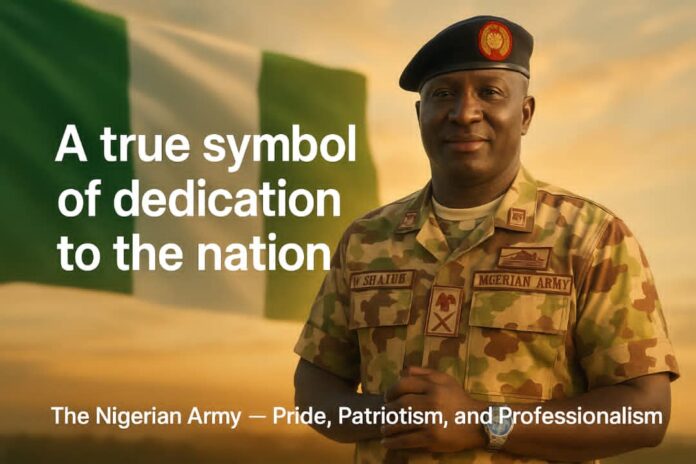The atmosphere inside the hallowed chamber of the Nigerian Senate was solemn yet expectant. The red-carpeted floor of the upper legislative house where laws are debated and the nation’s direction often determined bore witness to a moment of history on Monday morning as Major General Waidi Shuaibu, the newly appointed Chief of Army Staff, took his turn to address the distinguished lawmakers.
In his crisp olive-green uniform, decorated with medals that told tales of valour, service, and scars of battle, Maj. Gen. Shuaibu rose with calm authority. The gallery, filled with principal officers of the National Assembly, the Minister of Defence, and top-ranking military officials, fell into attentive silence.
“Distinguished Senators, honourable members, and fellow Nigerians,” he began, his voice steady but deeply resonant, “it is an honour to stand before you today not as an individual, but as a representative of the thousands of gallant officers and soldiers who have devoted their lives to defending our great nation.”
From that opening, the chamber listened intently as he traced his long and storied career in the Nigerian Army a career spanning three decades of command, leadership, and sacrifice in some of the country’s toughest battlefields.
Born on Dec. 18, 1971, in Olamo-Karapuka, Kogi State, Maj. Gen. Shuaibu joined the Nigerian Defence Academy as part of the 41 Regular Course. He was commissioned as a regular combatant officer on Sept. 17, 1994, and posted to the Nigerian Army Armoured Corps.
With a modest smile, he recalled his formative years in service years that shaped his understanding of command and the meaning of sacrifice. “I was privileged to serve in the Armoured Corps, where the courage of officers is measured not only by strength but by strategy and discipline,” he said.
As he spoke, senators nodded in approval. The Senate President and his deputy listened closely, occasionally exchanging glances of admiration as the general’s words carried both intellect and sincerity.
He went on to highlight his academic journey earning a Bachelor’s degree in Mechanical Engineering, and three postgraduate degrees, including two in Strategic Studies, from institutions in Nigeria and the United States. He also trained at the National Defense University, Washington, D.C., where he obtained a Diploma in International Security and Counter-Terrorism.
“I have always believed that education and training are the backbone of military excellence,” he said. “A soldier who understands strategy wins before he fights.”
Then came the moment that defined his address the reflection on his combat experience. The chamber fell silent as he recounted his years on the frontlines in the North-East, leading troops in fierce engagements against Boko Haram and ISWAP terrorists.
“As a young battalion commander in Monguno, I led troops through intense counter-insurgency operations. In one of those battles, I was wounded in action,” he said, his tone lowering slightly, “but that injury became my reminder that our duty to Nigeria comes before comfort or fear.”
He went on to recount his rise through various command appointments: Commanding Officer of 245 Battalion, Brigade Commander of 21 Special Armoured Brigade in Bama, General Officer Commanding 7 Division, Commander Sector 1 of Operation Hadin Kai, and later Theatre Commander of the entire North-East Joint Task Force.
During his command, he said, over 500 insurgents were neutralised and large caches of weapons recovered. His leadership also facilitated the rescue of 11 Chibok girls and the surrender of numerous terrorists who laid down their arms.
“Beyond the statistics,” he added, “our greatest achievement was restoring confidence to communities that had lost hope. We showed that the Nigerian Army stands with the people.”
At this, soft murmurs of approval rippled through the Senate floor. It was not just a speech—it was a testimony of service.
Maj. Gen. Shuaibu also highlighted his contributions to military strategy and doctrine development. As Chief Instructor at the Nigerian Army Armoured Corps and later as Director of Staff at the National Defence College, he helped introduce Strategic Estimates, a concept that reshaped the college’s approach to operational planning and was later published in the academic manual Strategic Thinking and Planning.
He spoke too of diplomacy his involvement in Nigeria’s defence partnerships with the Kingdom of Jordan, ECOWAS, and other international bodies.
“Today’s warfare is not only about firepower,” he told the lawmakers, “it is about alliances, intelligence, and technology. Our enemies are adapting fast, and so must we.”
The Senate chamber erupted in brief applause as he concluded his address with a solemn pledge:
“I stand here committed to leading a Nigerian Army that is professional, accountable, and people-centered. We will defend every inch of this country, and with your continued support, we will restore lasting peace to every corner of Nigeria.”he said.




